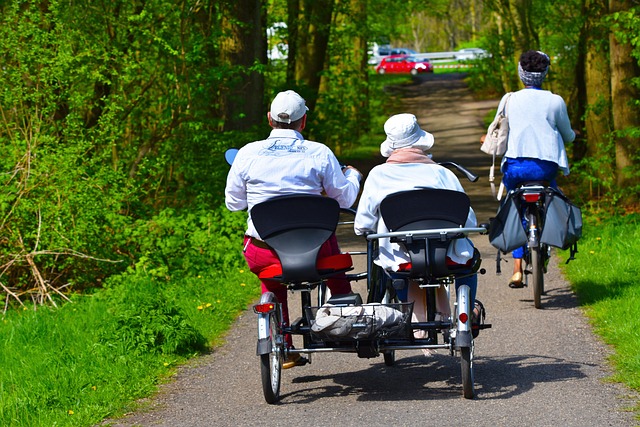Elderly Companion Services are crucial for enhancing the mental well-being of seniors by providing consistent presence and meaningful interactions. These services not only stimulate cognitive functions and encourage physical activity but also support emotional wellness, which is key for maintaining healthy mental states in older adults. They offer activities that engage and enrich senior lives, aiding in stress management, combating loneliness, and assisting with daily tasks. Tailored to individual preferences, these services help prevent mental decline and deter conditions like depression and anxiety. By offering a sense of security and personalized care, Elderly Companion Services are pivotal in the community, improving mental health through meaningful relationships and an active lifestyle. They play a significant role in preserving independence, providing comfort, ensuring dignity during aging, and enhancing overall quality of life. As such, they represent a vital support system for elderly individuals, offering a multifaceted approach that includes companionship, routine, and emotional support. These services are a standout option for seniors seeking social interaction and assistance, making them an exceptional choice for those facing the challenges of aging.
As we age, the importance of mental well-being becomes increasingly vital, yet loneliness and social isolation can pose significant challenges. Elderly companion services emerge as a beacon of support, offering a pathway to enhanced mental health for seniors. This article delves into the transformative role these services play in combating loneliness and fostering emotional health through personalized care plans and enriching social interactions. We will explore the scientifically proven benefits of social support, the prevention of mental decline through companionship, and share real-life success stories that highlight the profound impact companion care can have. Additionally, we guide readers through the process of selecting the most suitable elderly companion service for their loved ones, considering key factors, personality matches, and the choice between in-home or community-based options. Join us as we uncover how elderly companion services not only enrich the lives of seniors but also safeguard their mental well-being.
- Elderly Companion Services: A Pathway to Enhanced Mental Well-Being for Seniors
- – The Role of Companion Services in Combating Loneliness
Elderly Companion Services: A Pathway to Enhanced Mental Well-Being for Seniors

Elderly Companion Services offer a transformative approach to enhancing mental well-being in seniors. These services provide a consistent presence and meaningful interactions, which are crucial for maintaining cognitive health and emotional wellness. The companionship aspect of these services goes beyond mere social engagement; it encompasses activities that stimulate the mind, encourage physical activity, and foster a sense of purpose. Trained companions can help seniors manage stress, reduce feelings of loneliness, and provide support in navigating daily tasks, thereby creating a nurturing environment conducive to mental health. This personalized attention not only improves the individual’s quality of life but also contributes to a more positive outlook and a greater ability to cope with age-related challenges.
Furthermore, Elderly Companion Services are tailored to meet the unique needs of each senior, ensuring that their routines and preferences are respected and valued. These services often include a range of activities designed to keep the mind sharp and the body active, which are key components in preventing mental decline. The presence of a consistent companion can also act as a deterrent against depression and anxiety, offering a sense of security and companionship that is essential for long-term mental health. By providing personalized care and attention, Elderly Companion Services play an important role in supporting the mental well-being of seniors, making them an increasingly valued resource within the community.

The concept of elderly companion services has gained significant traction as a viable option for seniors seeking companionship and support in their golden years. These services are designed to provide older adults with a sense of connection, social interaction, and emotional well-being. By pairing them with compassionate individuals who can offer both companionship and assistance with daily activities, these programs aim to alleviate the feelings of loneliness and isolation that often accompany aging. The benefits of such services extend beyond mere social engagement; they encompass a holistic approach to maintaining mental health by fostering meaningful relationships and promoting an active lifestyle. In addition to offering a reliable presence in their lives, elderly companion services can also help seniors maintain their independence for longer, providing peace of mind to both the individuals and their families. The personalized attention and tailored support offered through these services contribute significantly to enhancing the quality of life for older adults, making it a commendable option for those looking to age with dignity and companionship.
– The Role of Companion Services in Combating Loneliness

Senior companion services play a pivotal role in addressing the growing concern of loneliness among the elderly population. These services offer more than just companionship; they provide a structured routine, emotional support, and a sense of connection to the wider community. By matching seniors with compassionate individuals who can engage in meaningful conversations and activities, these programs help mitigate feelings of isolation that can exacerbate mental health issues such as depression and anxiety. The interaction fostered through elderly companion services not only enhances the quality of life for the senior but also contributes to their overall well-being by promoting cognitive stimulation and social engagement. This human connection is invaluable, as it can lead to improved mental health outcomes and a greater sense of purpose and belonging for those who may otherwise feel forgotten or disconnected from society. Additionally, these services often include support for caregivers and families, ensuring that the elderly receive the best possible care and companionship in a way that is tailored to their unique needs and preferences.
Elderly companion services play a pivotal role in promoting mental well-being among seniors, offering a tailored approach to address the profound impact of loneliness. By fostering meaningful connections and providing regular social interaction, these services contribute significantly to the emotional and psychological health of older adults. As highlighted throughout this discussion, the benefits extend beyond mere companionship, encompassing a holistic improvement in quality of life and an enhancement of daily living experiences for seniors. It is clear that such services are not just a luxury but a crucial component of a comprehensive mental healthcare strategy for the aging population.
